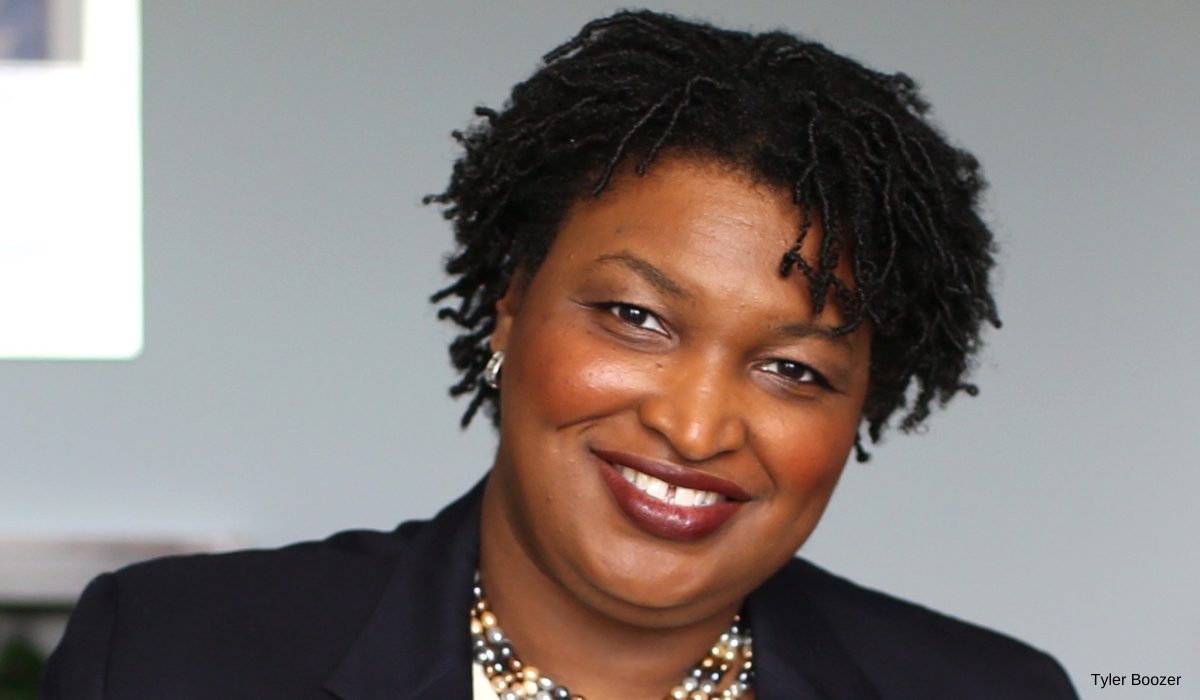Stacey Abrams’ Voting Rights Fight

As the United States prepares for one of the most consequential presidential elections in its history, the topic of voter suppression is once again front and center. An issue that politician and activist Stacey Abrams calls “one of the silent, but deadly effects on our democracy.”
Voter suppression is multifactorial – from purging, malfunctioning machines, “use it or lose it” rules, and closed precincts, to long lines, insufficient mail-in ballots, fundamental distrust in the system, stringent voter ID laws, and uncounted provisional ballots. In 2016 and 2018, 17 million people in the United States were purged from the voter registration rolls.
With an upcoming general election muddied by a pandemic and a Postal Service in disarray, the country is holding its breath in anticipation that every vote will be counted fairly and without a hitch in November.
As the first black woman in U.S. history to win a major-party gubernatorial nomination in 2018, Abrams stands alone in her unprecedented amassing of the largest Democratic voter turnout in Georgia, losing by a narrow – and controversial – margin of under 55,000 votes, which she attributes to voter suppression.
But the activist insists that the legacy of her election doesn’t hinge solely on the numbers: “One of the things we did differently in 2018, one of the reasons my campaign became so well-known was that we intentionally targeted and focused on communities that were left out of the narrative.”
In the aftermath of her gubernatorial bid, Abrams launched Fair Fight – a comprehensive platform that informs voters of their legal rights, unpacks the registration process, and shapes a path for activists to unite.
The native Southerner’s empathy and dedication to a just voting process is in her blood. Abrams’ grandmother – who cast her first ballot in 1968 with her husband after the Voting Rights Act of 1965 – left the house reluctantly to vote, anxiety-riddled with haunting memories of billy clubs and dogs that threatened her in the past. Abrams’ father was active throughout the Civil Rights Movement, and Abrams led the first voter registration drive at Spelman College, explaining, “Voting rights is a passion because it is how we fix democracy. It is how we fix the broken places… Our ability to vote shapes our future. I want my voice to be heard.”
“We should not be daunted by the size of the task, but we should have a sense of urgency about funding the task,” she says, referring to proposed legislation in Congress that would include up to $3.6B toward robust mail-in-voting funding. Thirty-four states and the District of Columbia allow vote by mail without excuses, while sixteen states allow mail-in ballot with excuses.
“This is not about building a new process, it’s simply expanding the process that we have,” Abrams says. “That means we not only have to put the money in, but have the resources to scale it, and the guardrails to make sure that no matter where you live in our country, your right to vote is real.”
Abrams’ professional path has so far been less linear than conventional politicians – a course that she defends through resounding confidence. “When people presume you can’t, it will not only sit there, it will settle in and like any infection it will touch others whether you intend it to or not, and I refuse to let anyone question my capabilities without answering it.”
Now, Abrams will add the title of “producer” to her resume with this week’s release of Amazon Studios’ “All In: The Fight for Democracy” — a film that highlights stories of voter injustices. Abrams’ devotion to the country’s voiceless is grounded in resilience, humility and resourcefulness borne of humble beginnings.
Growing up in a household where shut-off electricity or running water became “urban camping,” Abrams’ parents didn’t shelter her or her siblings from their upbringing. “There was never this bemoaning of our economic circumstances,” she tells me. “My parents wanted us to know that poverty was our economic status, but it spoke nothing of our character and nothing of our ambition. They never shielded us from the realities, but they shaped us to make certain that you can meet those realities.”
To the thousands of young girls in the South and beyond, whose upbringing echo Abrams’ seemingly “against the odds” arc, the activist remains a sturdy extension of her roots.
“Government is a lever for change – I want them [girls in Mississippi] to look at me and know they can imagine anything and that no one should be able to tell them they can’t,” she says. “It’s not enough to dream if you can’t do. It’s worth it to keep fighting. It’s worth it to keep trying, because when we give in, that’s when voter suppression works; not simply by blocking your access, but by convincing you that it’s not worth trying,” she appeals. “In a democracy it is your ability to amass like-minded people, to share your values and demand those values be represented, that change the outcome of elections.”
This essay was featured in the September 13, 2020 edition of The Sunday Paper. The Sunday Paper publishes News and Views that Rise Above the Noise and Inspires Hearts and Minds. To get The Sunday Paper delivered to your inbox each Sunday morning for free, click here to subscribe.

